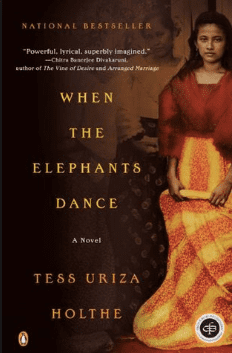When the Elephant Dance by Tess Uriza Holthe
Book Group 1 – May 2018

Tess Uriza Holthe’s When the Elephants Dance is set in the dying days of World War II as the Japanese and Americans battle for possession of the Philippines. The ‘elephants’ of course are the Japanese who have occupied the land for four years and the Amerikanos who have returned to liberate the Filipino people, who are referred to as ‘the chickens who must be careful.’The closing conflict is seen through the eyes of three characters: Alejandro, the 13-year old brother of Isabella, who is 17 and has gone missing and Domingo, a village resident who is an underground guerilla leader. Each takes on the role of narrator to advance the plot as well as storyteller to relate Filipino myths, which are embedded in each section. These myths gave us intriguing insight into traditions, beliefs, superstitions and values of the Philippines. The characters’ narration carries us through scenes of happiness, tragedy, unspeakable brutality, tenderness, graphic violence and suspense ultimately to the Japanese surrender. All three survive and the Philippines regained their independence.
This was the first Philippine novel read by most of our group so it felt fresh and different. We believe the strength of the novel lay in the myths, many of which were finely drawn and contained magical realism, appealing to our imagination. The actual narration of the plot seemed less well crafted. There was a bewildering cast of characters, 36 by Holthe’s count, who were tricky to keep straight. By the author’s own admission she had never been to the Philippines, which was apparent in passages like this one where Domingo’s men are on a mission in the jungle; “We creep through palm and bamboo trees, avoiding the exposed roots of the mangroves and the giant buttresses of the banyan trees that grew outward to support the top-heaviness of their branches.” We’re not even convinced Filipino houses have cellars. Many of us found the first part of the novel more gripping than the last half. Nevertheless for many of us reading this novel it filled in gaps in our knowledge of this part of the world and this period in history for which we are grateful.
Leslie Muri
